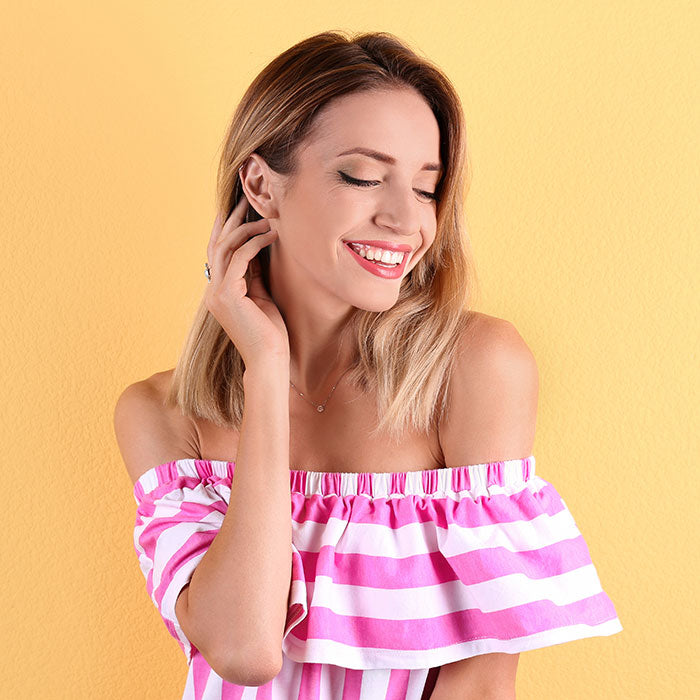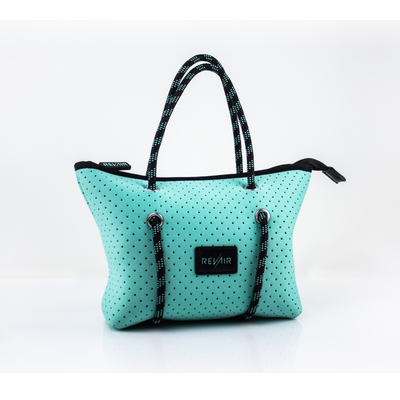
Four Myths About Straight Hair
Sleek, straight hair is a style achieved by many on a daily basis. Whether it’s natural or the result of a blow dryer and straightener, straight hair is a simple look that almost every single woman has rocked.
Although you can achieve straight hair temporarily, you are born with a certain hair type or texture. Within the hair type “straight hair,” there’s different characteristics, like whether or not it’s able to hold a curl, or if it has a slight wave.
Understanding Type 1 Hair
As we mentioned in our How Well Do You Know Your Hair Type blog, Type 1 is hair that is naturally straight with no curl pattern.

Straight hair typically grows faster than the other hair types. Straight locks tend to be on the shinier side because the hair’s natural oils are able to travel from root to tip, hence the reason why most women with straight hair wash their hair on a daily basis.
Type 1 hair can be broken down into 3 sub-categories, Type 1A, 1B, and 1C.
Type 1A hair is super fine hair that is straight from root to tip. It’s so straight that it’s very difficult for it to hold a curl, and it has little to no body.
Type 1B hair has some body to it, therefore it’s not as flat as type 1A hair. In its natural state, 1B hair is straight, but it can be manipulated to hold slight waves or curls.
Type 1C hair is usually the most dense of the 3 subcategories with the most body. It can also have a nice, tousled look when left to air dry.
Each category of straight hair calls for the use of different styling products to help maintain shine, body, and strength, which is why it’s important to use the knowledge of your hair type to help you find the right products for your hair.
Distinguishing Fact From Fiction
There are many beauty myths surrounding straight hair that have been circulated for years.
Separating fact from fiction will help those of you with straight hair avoid bad styling habits and understand the do’s and don’ts of straight hair.
Myth: Cold water helps keep hair shiny and straight.
Some women believe that washing their hair with cold water will keep it straight. This is not true.
No matter the water’s temperature, if your hair is not naturally straight, it will revert to its natural state when wet. What is true about cold water, is that it closes the hair cuticle and locks in moisture.
This is a huge benefit for your hair’s health and luster.
Myth: The higher the temperature setting of your heat styling tool, the better it will help maintain straight hair.

If this is a statement you believed to be true, listen closely. Heat is one of the easiest ways to damage your hair. We grew up believing the highest temp will straighten our hair the best.
But what it’s really doing is frying your hair, damaging your hair follicles, and causing frizz.
Typically Type 1A and 1B hair is usually the least dense hair type. This means your hair is more susceptible to damage from hot styling tools. If you’ve fallen victim to this myth, read up on 13 Ways to Repair Damaged Hair.
Myth: Combing hair from root to tip when wet helps promote straight hair.
Combing your hair wet without any product is a sure-fire way to cause your strands to break. Yes, it is true that combing from root to tip is a good technique, but only for detangling.
You should always detangle your hair with a wide tooth comb while using a conditioner. The conditioner creates slip and helps prevent you from combing out too much hair.
Myth: You can't make flat, fine hair look full of body.
Although it can be quite difficult to style Type 1A hair, it is possible for Type 1 hair to have body. Using styling tools like roller sets or spiral rods, you can create natural-looking waves.
How to Care for Straight Hair
People with straight hair face a variety of challenges ranging from limp locks to product buildup.
The biggest struggle with straight hair is that it has the tendency to look and feel greasy very quickly. Understanding your hairs personality will help you manage it better.
Here are a few dos and don’ts to be mindful of when caring for your straight hair.
Do:
Do wash your hair regularly to prevent styling products from building up in your hair.
Daily washes will keep your hair from looking oily and flat.
Because natural oils collect more easily in straight hair, you are more susceptible to having greasy-looking roots if you go too long between washes.
If you prefer to wash your hair every other day, use a dry-shampoo in between to refresh your roots and add volume to flat hair.
Do rev your hair!

Type 1 hair benefits from RevAir’s Reverse-Air Dryer by extending the length of time between wash days.
Why? Because of the Reverse-Air directional flow, RevAir helps to distribute the nutrient rich oils from the scalp down the length of the hair strands during the drying process.
This means that the scalp is less oily and stays feeling cleaner for longer.
Do try to avoid using any heat styling tools. If you must, use a heat protectant when using a blow dryer or straightener to decrease the heat damage to your hair.
The best alternative is to use the RevAir Reverse-Air Dryer. It uses little to no heat to dry and straighten locks.
Do use hairspray when curling your hair.
This will help to hold your curls in place. When styling, use your fingers instead of a comb or brush.
Don’t:
Don’t be heavy-handed with styling products.
As you know by now, straight hair naturally gets oily the quickest.
Using products like a serum or leave-in conditioner can quicken this process. Avoid using too much product when styling your hair.
A dime size of conditioner and 1-2 drops of serum at the end of your hair should get the job done.
Don’t trim your hair too often in order to help your hair grow faster.
Many people think the more they trim their hair, the quicker it will grow. According to John Barrett, owner of the John Barrett Salon in New York City, "hair grows a half-inch per month, whether you cut it or not.”
The key to retaining length is maintaining healthy hair. If you feel like your hair is not growing, it may be because every time it grows, the ends break off, making your hair look the same length.
Repairing masks and trims every few months are almost all you need.
Straight Hair Can Be Styled Many Ways
Many women with straight hair may feel that there aren’t a lot of hairstyles for them.
Finding the right hairstyle for you depends not only on your hair type but also on the shape of your face and the length of your hair. The shape of your face can be described as either Heart, Long, Oval, Square, Round.
Below are a few styling suggestions for women with straight hair and different shaped faces.

Heart-Shaped: Draw attention to your eyes and cheekbones with bangs or volume along the sides.
Long: The longer your hair is, the longer it will make your face look, therefore it’s often better to go with a shorter cut.
Oval: Lucky for you, almost any hairstyle pairs well with your face shape. In this case, finding a style for your hair texture is more important.
Square: Angled styles that have layers and end anywhere below the jawline complement square faces. An addition of bangs is a good idea, too.
Round: Short hairstyles, from a pixie cut to just below the chin work for you. Angular bobs are popular because the cut falls into place with little to no hair maintenance needed.
Layering is one of the top go-to hairstyles for women with straight hair with any face shape because of its versatility.
Layers add movement, body, and texture to hair strands that might otherwise look limp or lifeless. Hair stylists can judge the length of layers that would work best for your face shape and how to best cut them so that they grow out nicely.
Straight Hair Myths Debunked
This week’s blog was for our straight-haired readers. It’s important for people with type 1 hair to understand that their hair can be versatile, too.
We exposed four straight hair myths that have been passed around as truth, gave you key tips on the do's and don’t to maintain healthy, straight hair; and even gave you some new hairstyle inspiration!
Can you believe it’s August already?! It’s the perfect time to brainstorm new haircuts, hair colors, and hair tips for the upcoming Fall season.
If you want to see how RevAir’s Reverse-Air Dryer works on straight hair, check it out here. The results are smoother and shinier cuticles without the heat damage from a traditional blow dryer.
If you own a RevAir Reverse-Air Dryer, we would love to hear about your experience! Leave us a review.
Our goal is to arm our readers with the information they need to ensure they are doing everything they can to have healthy hair, no matter the texture.
With the right knowledge, tools, and products, it’s possible!

















